

Inside Amsterdam’s efforts to become a smart city. By Selena Larson on January 4th, 2015 Amsterdam wants to be smarter than you.
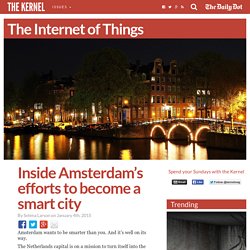
And it’s well on its way. The Netherlands capital is on a mission to turn itself into the smartest city in the world. Through a collaboration with government officials, private companies including telecom giant KPN, and the Amsterdam University of Applied Sciences, the city is quickly becoming a futuristic tech hub. More than half the world’s population lives in urban areas today, and that number is expected to climb to 66 percent by 2050. Amsterdam is the 16th smartest city in the world, and second most tech-intelligent, according to the Cities in Motion Index, a ranking of the smartest cities based on factors like urban planning, technology, the economy, and the environment.
“One of the main challenges right now is the ‘balance’ in the city,” Annelies van der Stoep, ASC project manager, told the Kernel. The organization’s 100 partners are involved in more than 70 projects throughout the city. StreetCare: un outil de création d’alerte en Crowdsourcing. Le futur de l'urbanisme par le crowdsourcing. En près de 50 ans, la population urbaine est passée de 34 % à 54 % sur une population globale qui a plus que doublé.
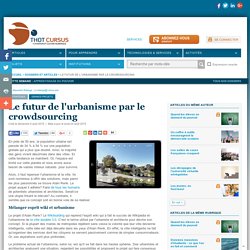
Ainsi, la majorité des gens vivent désormais dans des villes. Et cette tendance se maintient. Architects Imagine a Utopian Paris in 2100, a Little Warmer and a Whole Lot Greener. All Images: © Yannick Gourvil et Cécile Leroux, collectif et alors I've said it a lot recently, and it's only getting more true with time: when it comes to taking on climate change, Paris is kicking butt.

With major plans to redesign its river banks, create a pedestrian paradise out of the Les Halles shopping mall, and improve the already great Vélib bike share system, the City of Lights isn't slowing down. And now a new exhibit is having fun imagining what the City will look like in the year 2100: 2º C warmer, due to climate change, but also a whole lot greener, where pedestrians rule and every building has a roof garden. The exhibit, which is the work of Yannick Gourvil and Cécile Leroux of the architecture firm Collectif et alors, is called "+2º: Paris s'invente!
" Part of the City's Week of Sustainable Development (April 1-7), it was born of a simple idea: having acknowledged that the planet is getting warmer, how does Paris react? Journal des Énergies Renouvelables - SMART GRIDS OÙ SERA LA FUTURE ACADÉMIE ? (Newsletter du 14/10/2015) Smart grids - Où seront les futures académies ?
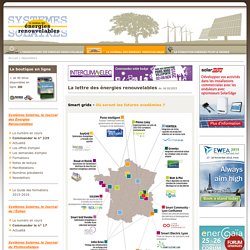
Légende : Carte de France des démonstrateurs qui testent déjà des fonctionnalités et services dans la gestion locale de l’énergie. Crédit : ERDF. On devrait connaître, avant la fin de l’année, les territoires qui accueilleront un futur campus dédié aux réseaux électriques intelligents, les smart grids. Les candidatures, proposées dans le cadre de l’Appel à manifestation d’intérêt (AMI) Campus “Réseaux électriques intelligents” sont actuellement passées à la loupe par l’équipe du plan de la Nouvelle France Industrielle. Bossez sans quitter votre vélo. Demain, vous pourrez bossez depuis un jardin public, depuis une piscine, un vélo, une boite de nuit, un bus, un avion, une boutique, etc.
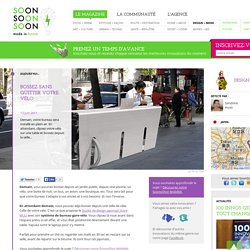
Tout sera fait pour que votre bureau s'adapte à vos envies et à vos besoins. Et non l'inverse. En attendant demain, vous pouvez déjà bosser depuis une selle de vélo. Celle de votre vélo. C'est ce que propose le Studio de design japonais Store MUU avec son système de bureau-gare-vélo. Parfait pour prendre un thé ou regarder ses mails en 30 sec en restant sur sa selle, avant de repartir sur le bitume. Vous souhaitez approfondir le sujet ? Votre bureau sera installé en plein air. Demain, vous pourrez installer votre bureau nomade dans un square public.

Sustainable cities: innovative urban planning in Singapore. Cities present a sustainability conundrum: though they are the most efficient way to provide infrastructure and services for large populations, they are, in absolute terms, incredibly inefficient.
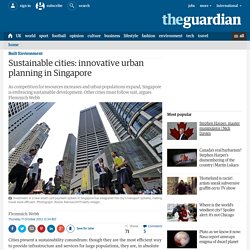
Cities cover just 2% of the Earth's surface yet consume about 75% of the world's resources, and given that more of the world's population now live in cities than in rural areas, it's clear they are key to tackling climate change and reducing resource use. Urban administrators face huge challenges to make cities more sustainable.
From traffic jams and inefficient buildings to social inequality and housing, the problems are complex and hard to tackle — but not insurmountable. Some cities are forging ahead with the use of innovative urban planning, technological and governance models, showing that with the right focus and resources, cities can become "smart" or more sustainable. Singapore's experiences have important lessons for other urban centres. 12 reasons why Singapore is the greenest city on Earth. Singapore's not just the greatest city in the world, it's also the greenest.
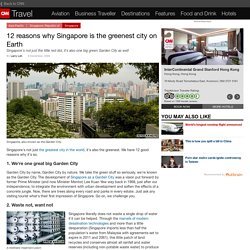
We have 12 good reasons why it's so. 1.